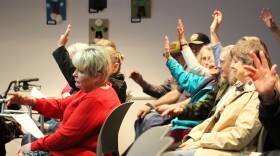Every year, dozens of organizations and businesses around the central Kenai Peninsula come together for Project Homeless Connect. The one-day event, which was held in January, makes resources available to people experiencing homelessness. The services range from haircuts and hand massages to housing information and hot meals.
Leslie Rohr’s nonprofit helps put the event on and she said it drew more than 100 participants this year.
“We had a packed house at the Project Homeless Connect event,” she told the Soldotna City Council on Feb. 26. She’s the executive director of Love INC, an inter-denominational Christian nonprofit. “We had 31 or 32 vendors – we couldn’t fit another person in there.”
Still, that’s slightly down from last year, and significantly down from the years leading up to the COVID-19 pandemic.
Beyond providing resources, Project Homeless Connect also serves as a crucial collection point of data on homelessness that gets sent to the federal Department of Housing and Urban Development.
When participants arrive at the event, they complete an intake form that collects demographic information and asks for details about the circumstances that caused them to become homeless.
That data collection is a sort of census of people experiencing homelessness. It’s an annual coordinated count.
“So our 2025 point-in-time count: The question was asked, ‘For Jan. 27, where did you sleep last night?’" Rohr said. “This count is done across the country.”
This year, the people who attended represented nearly 200 total household members. A majority of participants reported having some type of disability and more than a quarter said they’re currently living with friends or family.
A third of attendees reported experiencing homelessness for the first time, while another third have been homeless multiple times. One sixth of attendees said they had to move because their housing was a short-term rental.
At the city council meeting, Rohr paused on this chart:

“The green line is – they’re living someplace that’s not meant for human habitation,” she said. “And, again, this year having more people living in uninhabitable places is alarming.”
Groups on the central Kenai Peninsula have tried for years to open an emergency cold weather shelter. In 2022, Rohr helped open the doors to the Nikiski Shelter of Hope, which houses people experiencing homelessness on a temporary, transitional basis.
Since the shelter opened, Rohr said it’s served more than 200 adults and nearly 60 children. But Rohr said this year’s Project Homeless Connect participants indicate the need for an emergency shelter hasn’t gone away.
“Seventy-five percent stated if an emergency cold weather shelter existed they would use it,” she said.
Rohr also reported the latest federal data on housing wages and affordability. Housing is considered affordable if it costs less than 30% of a household’s total income. In Alaska, the so-called housing wage is almost $30 per hour to affordably rent a fair market, two-bedroom apartment at $1,500 a month.
“$28.61 is what’s considered a housing wage for the state,” she said. "And not very many of our people make $28.61.”
Alaska’s minimum wage is increasing in July – but only to $13 per hour. That’s going to increase again to $15 by 2027 under a ballot measure approved by voters last year.
Rohr told the council she and other organizers are already looking ahead to next year. She says they’re excited to move Project Homeless Connect to the new Soldotna Field House – scheduled to open this summer – which will be able to accommodate more people and more services.







